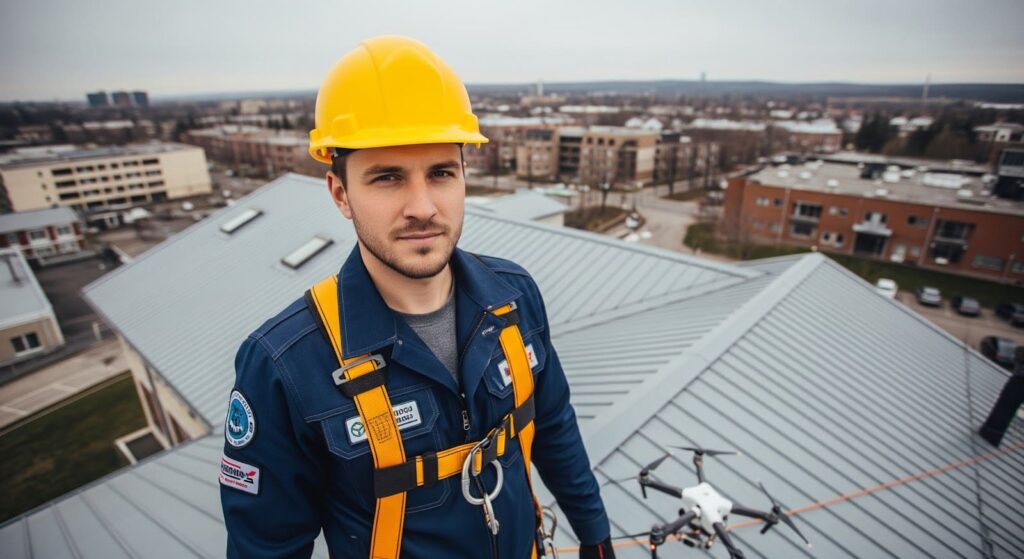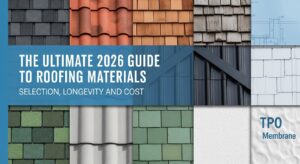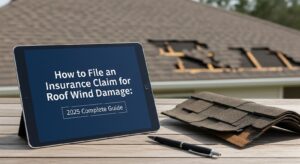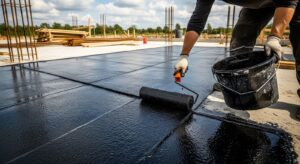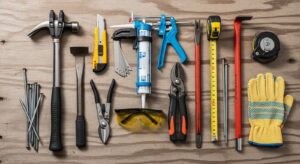How to become a roof inspector is a great question if you’re looking for a career that offers flexibility, growth, and the opportunity to protect homes and businesses.
Roof inspectors are in high demand, helping ensure the safety and structural integrity of buildings. If you’re detail-oriented and enjoy problem-solving, this career could be a perfect fit. In this guide, we’ll walk you through the steps, certifications, and skills required to become a roof inspector. Whether you’re interested in residential or commercial inspections, becoming a roof inspector offers a rewarding path with plenty of opportunities for advancement.
What Does a Roof Inspector Do?
A roof inspector is a trained professional responsible for evaluating the condition of roofs, both residential and commercial. Their job goes beyond just inspecting shingles—they assess the overall structural integrity of the roofing system, ensuring it can withstand the elements, prevent leaks, and provide long-term protection for the property. Roof inspectors also provide detailed reports to property owners, which help them make informed decisions about necessary repairs or replacements.
Key Responsibilities of a Roof Inspector
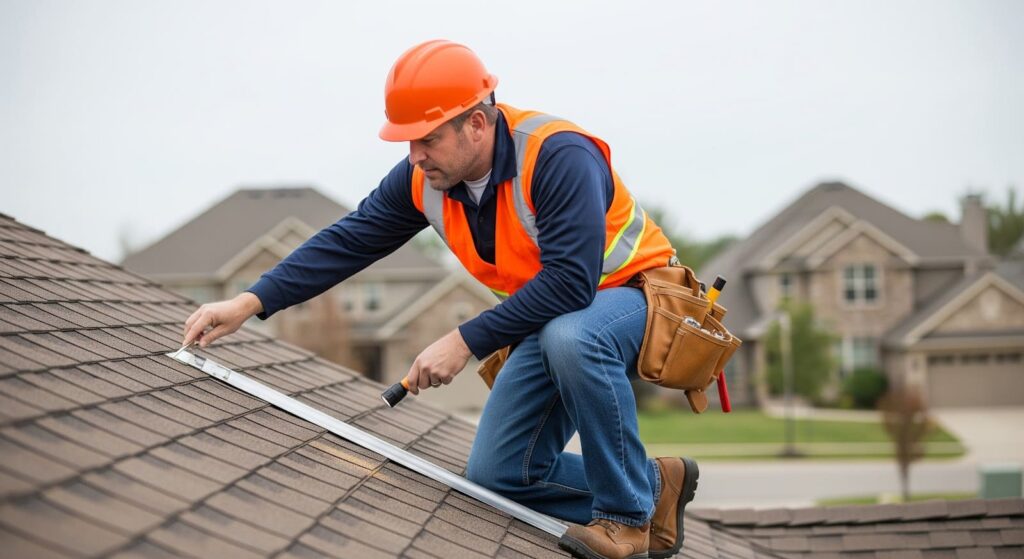
- Visual Inspection: Inspecting for visible damage such as missing shingles, leaks, cracks, and damaged flashing.
- Structural Integrity Assessment: Checking the underlying framework, supports, and load-bearing structures of the roof.
- Material Evaluation: Ensuring roofing materials (e.g., shingles, tiles, membranes) are installed correctly and are suitable for the environmental conditions.
- Safety Checks: Identifying any safety hazards that could endanger residents or workers.
- Documentation and Reporting: Generating detailed reports with findings and suggested actions, including photos and expert recommendations for repairs.
For more in-depth insights into residential roof inspections, check out our guide on Residential Roof Inspection Secrets. It covers essential tips and expert advice to help you understand the key aspects of inspecting residential roofs effectively.
Steps of How to Become a Roof Inspector
Step 1: Assess Your Qualifications and Experience
To become a certified roof inspector, having a background in construction, architecture, or engineering can be beneficial but is not required. If you have experience in the roofing industry or construction, you will have a strong foundation for becoming a roof inspector. Key skills that will make you successful include:
- Attention to Detail: Essential for identifying small defects that could lead to costly problems.
- Problem-Solving Skills: Roof inspectors need to understand how various issues interact and recommend solutions.
- Physical Fitness: Roof inspections often require climbing ladders and walking on roofs, so being in good physical shape is important.
- Communication Skills: Clear communication with clients and the ability to explain technical issues in a way that’s easy to understand.
Step 2: Obtain Roof Inspector Certification
Certification is key to building credibility in the roof inspection industry. Several reputable organizations offer certification programs:
- InterNACHI: Offers certification for roof inspectors with comprehensive training in roof systems and materials.
- NRCIA: Specializes in roofing systems and provides extensive training on inspection techniques, safety protocols, and reporting.
Certifications typically involve coursework, exams, and continuing education requirements to maintain certification. Some programs also offer hands-on training, which is crucial to mastering the inspection process.
Step 3: Gain Hands-On Training and Experience
Training doesn’t stop at the classroom. Gaining field experience is essential. Consider internships or entry-level positions with roofing contractors, home inspection companies, or real estate firms. During this phase, you’ll get familiar with real-world roof inspection tasks, such as using advanced tools like:
- Drones for aerial inspections.
- Infrared Cameras for detecting leaks and moisture issues.
- Moisture Meters for assessing the internal integrity of roofing materials.
Step 4: Explore Career Opportunities or Start Your Own Business
Once certified, roof inspectors have multiple career options:
- Work for Home Inspection Companies: You can join established companies as a full-time or part-time roof inspector.
- Start Your Own Business: For entrepreneurs, starting your own roof inspection business can be a rewarding career choice. Consider partnering with home inspection franchises like WIN Home Inspection for a streamlined approach and comprehensive training.
Technological Tools in Roof Inspections
With the advancement of technology, roof inspections are more accurate and efficient than ever before. Roof inspectors now use a variety of tools to provide more thorough evaluations:
- Drones: Drones provide high-resolution aerial views of roofs, making it easier to assess large or hard-to-reach areas.
- Thermal Imaging Cameras: These are used to detect leaks, water damage, and insulation issues that may not be visible to the naked eye.
- Moisture Meters: Used to assess whether moisture has infiltrated roofing materials, leading to potential mold or structural damage.
Advanced Certifications and Specializations
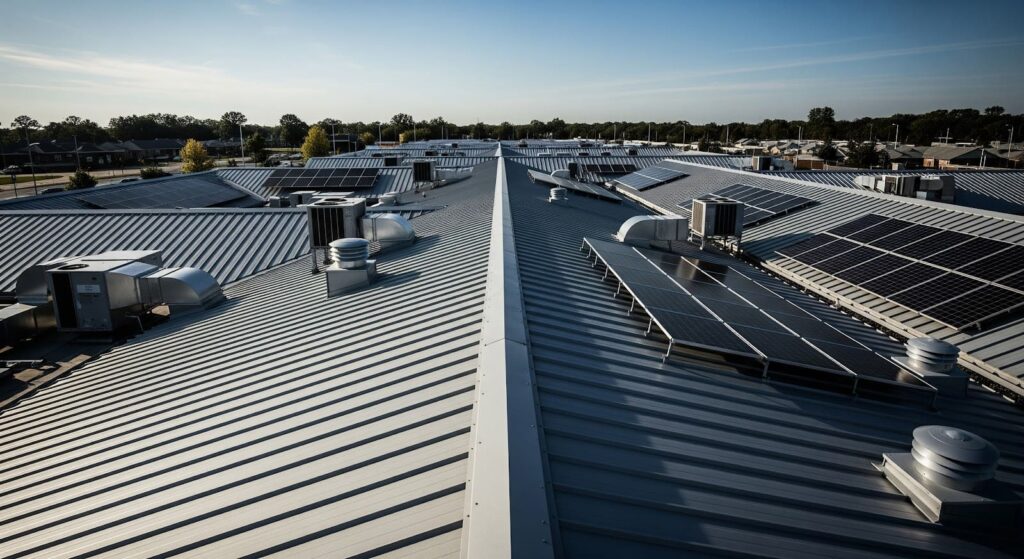
As a roof inspector, you can specialize in different types of roofing systems:
- Commercial Roof Inspections: These require specialized knowledge, especially when dealing with low-slope and flat roofs. Consider taking courses like the Commercial Roof Inspection Online Course offered by the CCPIA to specialize in this area.
- Historical Roof Inspections: Some inspectors specialize in older, historically significant buildings, which require a deeper knowledge of traditional roofing materials and techniques.
Continuing education is vital in this field. Look for accredited programs that offer new training in evolving roofing systems and emerging technologies.
FAQs
What qualifications do you need to be a roof inspector?
To become a roof inspector, you typically need a high school diploma and experience in construction or roofing. Certification from organizations like InterNACHI or NRCIA is also essential.
How hard is it to be a roof inspector?
It requires training, certification, and hands-on experience. The job is physically demanding but manageable with the right preparation and skills.
How much does it cost to get a roof inspection certified?
Certification costs typically range from $200 to $1,000, depending on the program. Additional costs may apply for continuing education.
Is Haag certification worth it?
Yes, Haag certification is valuable for those focusing on damage assessments and insurance claims, offering specialized knowledge and credibility.
How to start a roof inspection business?
Start by getting certified, gaining experience, registering your business, and investing in tools. Then, market your services through networking and online presence.
Can a home inspector do a roof inspection?
Yes, but for a more detailed and specialized inspection, it’s best to hire a certified roof inspector.
Conclusion
Becoming a certified roof inspector offers a solid career path with plenty of opportunities for growth. By gaining experience, obtaining certification, and staying up-to-date on industry trends and technologies, you can build a rewarding and flexible career.
Whether you decide to join a roofing company, start your own business, or specialize in commercial or historical roof inspections, the options are abundant. Take the first step today by enrolling in a certification program and gaining hands-on experience to become a trusted expert in the field.
Want to learn more about roof inspections or need expert advice on maintaining your roof? Explore our blog for in-depth articles, tips, and industry insights to keep your roof in top condition. Stay informed and protect your property today!

